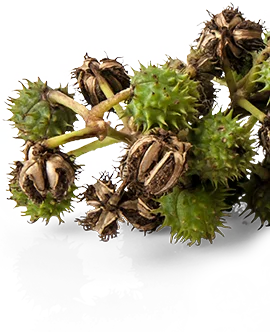CO/HCO Ethoxylates
- Home
- »
- CO/HCO Ethoxylates

CO/HCO Ethoxylates
CO/HCO ethoxylate castor oil refers to castor oil that has been ethoxylated, alchemical process that involves reacting castor oil with ethylene oxide to produce ethoxylates. These are derivatives of castor oil that are often used as surfactants or emulsifiers in various applications.
- Cosmetics & Personal Care
- Pharmaceuticals
- Industrial Uses
- Food Industry
ENGINEERED FOR INDUSTRIAL EXCELLENCE
01
High Oxidation Stability
Blown Castor Oil is produced through a controlled oxidation process, resulting in enhanced viscosity and stability. This makes it highly suitable for industrial applications where resistance to oxidation is essential.
02
Tailored for Industrial Use
This oil is widely used in industries such as lubricants, paints, inks, and sealants. Its unique properties, such as thick consistency and drying nature, make it an ideal base material for manufacturing.
03
Eco-Friendly and Biodegradable
Blown Castor Oil is derived from castor beans and processed without toxic additives. It’s a biodegradable and sustainable alternative to synthetic oils, supporting environmentally responsible production.
04
Versatile Performance Benefits
The oil’s film-forming ability and moisture resistance provide excellent surface protection and adhesion in coatings. Its consistent performance across various temperatures adds to its industrial value.

Your questions answered
Why choose us
What are Castor Oil and Hydrogenated Castor Oil Ethoxylates?
CO/HCO ethoxylates are non-ionic surfactants produced by reacting castor oil or hydrogenated castor oil with ethylene oxide. They offer excellent emulsifying, solubilizing, and dispersing properties across various industries.
What are the main differences between CO and HCO ethoxylates?
CO ethoxylates are derived from natural castor oil and retain some unsaturation, while HCO ethoxylates are based on hydrogenated castor oil and are more stable, with better resistance to oxidation and heat.
In which industries are CO/HCO ethoxylates commonly used?
They are widely used in textiles, cosmetics, agriculture (as emulsifiers in pesticide formulations), detergents, and industrial cleaners due to their versatile surface-active properties.
Are CO/HCO ethoxylates biodegradable and environmentally safe?
Yes, both types are considered biodegradable and are often chosen for eco-friendly formulations. However, their environmental impact also depends on the specific ethoxylation level and usage context.
Can the ethoxylation level be customized?
Yes. The number of ethylene oxide (EO) units can be tailored to adjust solubility, HLB value, and performance characteristics depending on the end-use application.